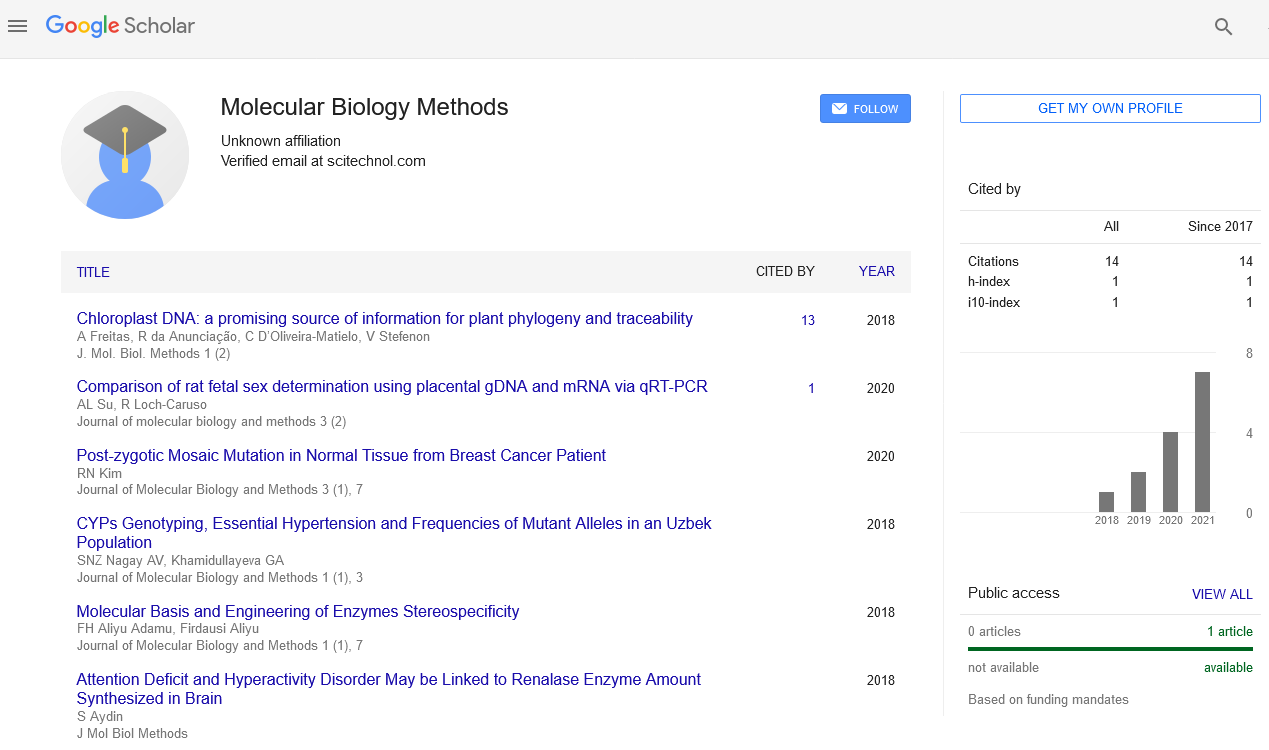Opinion Article, J Mol Biol Methods Vol: 6 Issue: 2
Integrative Analysis of Multi-Omics Data to Uncover Biomarker Signatures in Complex Diseases using Bioinformatics Tools
Robert Jiannoudis*
1Department of Trauma and Orthopaedics, School of Medicine, University of Leeds, UK
*Corresponding Author: Robert Jiannoudis,
Department of Trauma and Orthopaedics,
School of Medicine, University of Leeds, UK
E-mail: robertjinnoudis@gmail.com
Received date: 26 May, 2023, Manuscript No. JMBM-23-108096;
Editor assigned date: 30 May, 2023, Pre QC No. JMBM-23-108096 (PQ);
Reviewed date: 14 June, 2023, QC No. JMBM-23-108096;
Revised date: 22 June, 2023, Manuscript No. JMBM-23-108096 (R);
Published date: 29 June, 2023, DOI: 10.4172/jmbm.1000135
Citation: Jiannoudis R (2023) Integrative Analysis of Multi- Omics Data to Uncover Biomarker Signatures in Complex Diseases using Bioinformatics Tools. J Mol Biol Methods 6:2.
Description
Complex diseases, such as cancer, cardiovascular disorders, and neurological conditions, often result from intricate interactions among multiple genetic, epigenetic, and environmental factors. Traditional approaches in biomedical research, which focus on analyzing individual molecular datasets, have limitations in capturing the full complexity of these diseases. To overcome these challenges, bioinformatics researchers have turned to integrative analysis of multiomics data, an approach that combines information from diverse molecular levels to reveal comprehensive insights into disease mechanisms and identify potential biomarkers for early detection, diagnosis, and personalized treatment. This article explores the significance and impact of integrative analysis in the context of complex diseases. Multi-omics data refers to the collection of different molecular profiles, such as genomics, transcriptomics, epigenomics, proteomics, and metabolomics, from the same set of biological samples. These datasets provide a holistic view of cellular processes and interactions, shedding light on how the genome, epigenome, transcriptome, proteins, and metabolites work together to maintain cellular function and contribute to disease development. Integrative analysis enables researchers to combine and analyze multi-omics data simultaneously, allowing them to identify patterns, correlations, and potential causal relationships that would be overlooked when examining each dataset in isolation. By integrating information from various omics layers, researchers can gain a deeper understanding of the biological networks and pathways underlying complex diseases. Several bioinformatics tools and algorithms have been developed to facilitate the integration of multi-omics data.
This approach involves constructing biological networks that represent interactions between molecules, such as genes, proteins, and metabolites. By overlaying multi-omics data onto these networks, researchers can identify key nodes (hubs) that play crucial roles in the disease process. Additionally, network-based integration can reveal the crosstalk between different molecular layers, highlighting the interconnectedness of cellular processes. Statistical Integration: Statistical methods are used to integrate multi-omics datasets by combining individual molecular profiles and identifying patterns that are significantly associated with disease.
Techniques such as Canonical Correlation Analysis (CCA), Principal Component Analysis (PCA), and cluster analysis are commonly employed to uncover shared and unique features across different omics data types. One of the primary objectives of integrative analysis is to identify biomarker signatures that can aid in disease diagnosis, prognosis, and treatment selection. Biomarkers are specific molecular features, such as genes, proteins, or metabolites, whose expression levels or modifications are associated with disease presence or progression.
Researchers have successfully used integrative analysis to identify driver mutations, characterize tumor heterogeneity, and discover potential therapeutic targets in various cancer types. Integrative analysis has revealed key molecular pathways involved in cardiovascular diseases, paving the way for the development of novel diagnostic and therapeutic approaches. In neurodegenerative diseases like Alzheimer's and Parkinson's, integrative analysis has been valuable in understanding the underlying pathogenic mechanisms and identifying potential biomarkers for early detection.
Despite its potential, integrative analysis of multi-omics data is not without challenges. The complexity of integrating diverse datasets, the need for sophisticated computational tools, and the requirement for large-scale, well-curated datasets are some of the hurdles faced by researchers. Looking ahead, advancements in bioinformatics, machine learning, and data integration techniques will continue to enhance our ability to unravel the complexities of complex diseases. Integrative analysis holds the key to unlocking valuable insights into disease biology, ultimately leading to improved patient outcomes through personalized medicine approaches based on robust biomarker signatures.
 Spanish
Spanish  Chinese
Chinese  Russian
Russian  German
German  French
French  Japanese
Japanese  Portuguese
Portuguese  Hindi
Hindi 